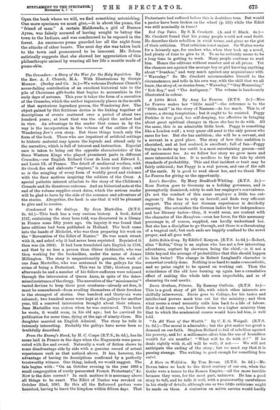Condemned to the Galleys. By Jean Marteilhe. (R.T.S. 3s. 6d.)—This
book has a very curious history. A book, dated 1757, containing the story here told, was discovered in a library in France some fifty years ago. On inquiry it was found that later editions had been published in Holland. The book came into the hands of Michelet, who was then preparing his work on the "Revocation of the Edict of Nantes." He was much struck with it, and asked why it had never been reprinted. Reprinted it then was (in 1864). It had been translated into English in 1758, and that by no less a person than Oliver Goldsmith, who was then working for the booksellers, under the name of James Millington. The story is unquestionably genuine, the work of one Jean Marteilhe, who was sentenced to the galleys for the crime of being a Protestant. This was in 1700; thirteen years afterwards he and a number of his fellow-sufferers were released through the intercession of Queen Anne, in spite of the deter- mined resistance of the clergy. The narrative of the "missionaries" " varied devices to keep these poor creatures—already set free, it must be remembered—from availing themselves of their freedom is the strangest of stories. One hundred and thirty-six were released; two hundred more were kept at the galleys for another year, till a renewed intercession brought about their release. Jean Marteilhe was sixteen when he was sentenced. This book he wrote, it would seem, in his old age ; but he ziirvived its publication for some time, dying at the age of ninety-three. His daughter married an English Admiral. The story he tells is intensely interesting. Probably the galleys have never been so truthfully described.


























































 Previous page
Previous page